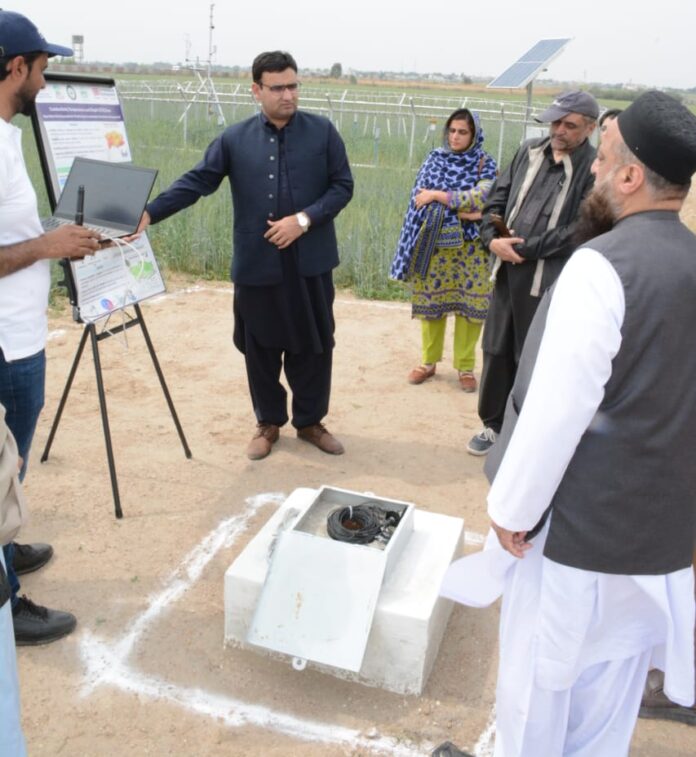- Advertisement -
PESHAWAR, Mar 26 (APP): The International Water Management Institute (IWMI), a global research-for-development organization, is deploying cutting-edge scientific equipment in two districts of Khyber Pakhtunkhwa (KP) to optimize crop water usage, reduce carbon emissions, and enhance agricultural sustainability.
The Eddy Covariance (EC) Flux Tower, a sophisticated monitoring system, will provide precise data on water and energy fluxes, critical for understanding the interplay between farming practices and the environment.
These details were shared by Dr. Umar Waqas Liaqat, IWMI’s Irrigation Researcher during a field trip to the Barani Agriculture Research Institute (BARI) in Chakwal by journalists of KP to observethe operation of EC Flux Tower.
“IWMI has already introduced this state of the art technology for the first time in Pakistan in four districts of Punjab including Chakwal, Okhara, Rahim Yar Khan and Faisalabad districts,” Dr. Umar informed newsmen.
The initiative has been taken by IWMI under its Water Resource Accountability Programme (WRAP) launched with the support from Foreign Commonwealth & Development Office (FCDO) and CGIAR’s Nexus Gains Initiative.
As a component of WRAP, IWMI has started its operation in Khyber Pakhtunkhwa in December 2023 to assist provincial government in addressing critical water governance and management challenges.
The existing EC systems in Punjab are tracking 70+ variables including critical water, carbon, and energy fluxes across key agricultural zones equipping us with essential data to drive sustainable, data-informed solutions in agriculture, he added.
The technology, he continued, will now be replicated in Khyber Pakhtunkhwa in two districts including Charsadda which relies on irrigated agriculture and Mansehra, where agriculture depends on rainfall.
Briefing newsmen, Dr. Umar elaborated that EC Flux Tower which is installed only in Pakistan in South Asian region, operates for continuous measurement of the exchange of gases and energy between the land surface and the atmosphere.
An EC flux tower is equipped with advanced sensors such as CO2, H2O analysers and net radiometers, providing direct and continuous measurement of water usage (evapotranspiration), energy consumption and carbon emission associated with specific crops within a radius of 200 to 500 meters.
The device help in monitoring climatic parameters, air temperature, humidity. It also helps in drought monitoring and water conservation besides boosting agriculture and precision farming by monitoring crop responses.
“This system is pivotal for environmental and ecological research particularly in ecosystems such as forests, grasslands, wetlands and agriculture fields,” Dr. Umar continued.
The information collected from EC flux towers is critical for developing strategies to optimize water use efficiency, reduce carbon footprints and enhance overall sustainability in agricultural production, he reiterated.
The high resolution temporal data collected through EC flux towers allow researchers and policymakers to respond to short-term environmental events and make informed decisions on water management practices.
Additionally, the data collected from these towers can be used to validate remote sensing models, improving the accuracy of large scale evapotranspiration estimates and contributing to better water resource management at regional and national levels.
Furthermore, the flux tower system helps in creating more accurate inventory of greenhouse gas emission from irrigated crops, aiding efforts to mitigate climate change impacts in the region.
Apart from installation of EC Flux Towers, IWMI will also provide Chameleon Soil Moisture Sensors to supporting farmers in KP with data driven decisions at critical growth stages through real time soil moisture tacking.
The sensors will prevent water overuse and minimize crop water stress besides enhancing resilience against extreme weather.
On this occasion, Dr. Nadeem Ahmad, Director BARI apprised newsmen about working relation between IWMI and BARI in tacking of threats posed by climatic changes on agriculture sector.
He also informed about initiatives taken by BARI including establishment of Centre of Excellence for Olive Research and Training (CEFORT), introduction of Blackberry Production in Pakistan, Watershed Rehabilitation Technologies and Irrigation Improvement etc.

